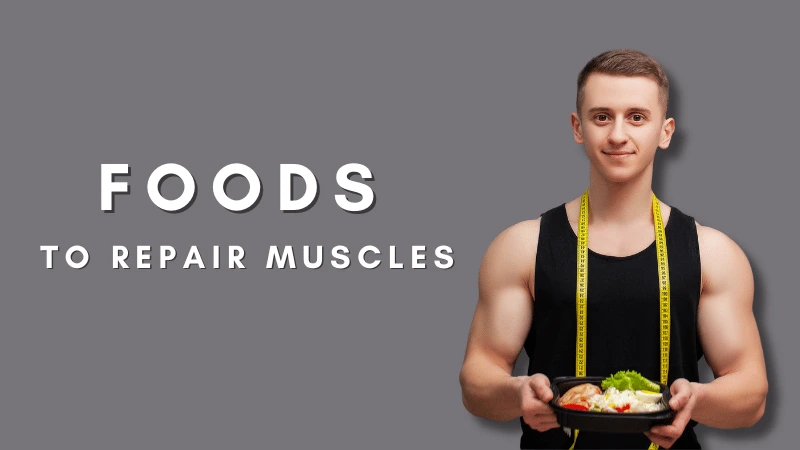High-intensity workouts are called the best friends of bodybuilders for their immense strength-boosting and muscle-gain powers.
But what comes after a workout is the risk of muscle soreness, cramps, and injuries if your muscle repair system is lagging.
So what helps repair muscle tissue? While stretching, and post-workout care forms prevent the damage, it’s your diet that has the healing effect. But unfortunately, people don’t know what foods help repair muscle damage.
Today, we are gonna focus on some of the essential foods in this diet to help your muscles recover from any injuries, pulls, or tears.
So let’s quickly gear up to naturally heal your muscles with the following foods that you might not have noticed till now.
What Foods Help Repair Muscle Damage?

Muscle damages are caused by numerous reasons like the tears that were not able to fill up due to the weak protein content of your diet.
Excessive pulls, less oxygen circulating through muscles during workouts, excessive free radicals, and a chronic inflammatory response of your muscles are some of the other reasons.
The following Superfoods for muscle can help you deal with all such mechanisms and heal as well as prevent muscle injuries:
1. Rich Protein Reserves
Amino acids are the key factors that heal the microtears of your muscles and fill them up with new muscle cells.
Hence to fulfill the high demand for amino acids during workout it is essential to load up your platter with some good protein sources like:
#1. Chicken breasts – serve as literally the best source of protein with 31 grams of protein per 100 grams of lean meat.
#2. Fishes – help in healing muscle tears naturally as they carry 25 grams of protein per 100 grams on average, with salmon being the best of the fishes you can get your hands on.
Since they also come with omega fatty acids that further enhance their repair power.
#3. Eggs – It comes under the list of superfoods for bodybuilding or bodybuilding as they are best for recovery after a workout. This protein-rich food is also easily available, and a versatile option for meals, which gives you 13 grams of proteins per two large eggs.
#4. Quinoa – offers 8 grams of protein per cup to infuse your muscles with essential amino acids to quickly heal up your muscle tears.
2. Vitamin C Sources
A leading cause of muscle injuries is the extended inflammatory responses of the muscles, and the imbalance between free radicals and antioxidants.
Vitamin C rich with antioxidants, helps curb all these effects to heal your muscles naturally.
To add the goodness of the vitamin to your diet add the following sources:
#1. Strawberries – contains 59 mg of vitamin C per 100 grams with a variety of meal and dessert plans.
#2. Kiwi – has 90 mg of Vitamin C per 100 grams of the fruit.
#3. Bell peppers – the red and yellow bell peppers can load you up with 80-100 mg per 100 grams.
#4. Broccoli – keeping the broccoli raw can give you 89 mg of Vitamin C per 100 grams. You can even saute it lightly or boil it.
#4. Pineapple – will be the tastiest way to increase your Vitamin C content with 47 mg per 100 grams.
3. Vitamin A for Additional Support
Even people who know what foods help repair muscle damage tend to avoid this vitamin A.
This vitamin gives an additional package of anti-oxidants to hunt down the free radicals damaging your muscle cells.
Since they also help in new cell formation, they help increase muscle recovery.
Some Sources of vitamin A are:
#1. Carrots – can give up to 334% of the daily value recommendations per 100 grams.
You can add carrots to your salad and even saute it with different seasonings to enjoy a healthy snack.
#2. Spinach – comes loaded with 188% of the daily value of Vitamin A recommendation per 100 grams.
They are best consumed when boiled or added to salads.
#3. Kale – salads, soups, and sauteed veggies are the best ways kale can be used to extract 206% of the DV per 100 grams.
#4. Mango – can also be a vitamin C source, but for the A, it has 54% of the daily value per 100 grams.
4. Zinc for Rapid Protein Synthesis
Zinc is the one mineral that is used in bodybuilding but still, most people don’t know why zinc is important for bodybuilding and that’s why they keep ignoring it.
This mineral participates in protein synthesis and, therefore, individuals should combine it with a high-protein diet
Other than that, they are the coenzymes for the muscle synthesis process, and can also give you high amongst of energy.
Hence you are looking for the answer to what helps muscles recover faster, the following foods loaded with zinc are your answer:
#1. Oysters – are quite high in zinc and contain 500% of the daily value per 100 grams. Hence they should be taken in lesser quantities.
#2. Pumpkin seeds – have 65% to 70% of the DV per 100 grams and are best enjoyed with salad or yogurt.
#3. Cashews – have 20-25% of the DV per 100 grams and can be just popped in before your workout to increase your energy levels through the workout.
However, the body requires zinc in trace amounts, and the recommended dietary intake is 11 mg for men and 8 mg for women.
Hence keep your consumption in this range to felicitate the best of its benefits.
5. Omega-3-Fatty Acids
These are the foods that help with muscle soreness and recovery as they potentially lower inflammation and swelling of your muscles.
Some of the rich sources of omega-3-fatty acids are:
#1. Fatty Fishes – offer 1.1 to 1.9 grams of omega-3 fatty acids per 3 ounces of cooked fish. The best fatty fish are tuna, salmon, and mackerel which are easily available in the market.
#2. Flaxseeds – have 7.3 grams of fatty acids in just one tablespoon.
#3. Walnuts – can give you 2.5 grams of fatty acids per 28 grams of serving.
#4. Hemp Seeds – are the recent favorites in salad dressings and contain 2 grams of fatty acids per tablespoon.
Add all these foods to your diet to repair muscle damage and for better recovery. Also, don’t forget to talk to health experts before changing your diet as not everything suits everyone.
Conclusion
While Discussing the topic “What foods help repair muscle damage” we learn that one can naturally stimulate muscle recovery by adding some rich nutrient profiles to your diet.
The most effective way is to keep up with the protein sources, and curbing down inflammation and soreness is possible with vitamins and minerals.
Now, since you are aware of which foods are good for muscle recovery, you must also be aware of the worst foods for muscle recovery.
Some of the foods that we recommend you avoid when facing muscular problems post-workout are sugars, fried foods, energy drinks, too much caffeine, and high-sodium foods.
That being said, if the foods don’t work well for you and the muscle soreness or other symptoms persist at the same level, we recommend visiting a doctor to rule out underlying problems.
